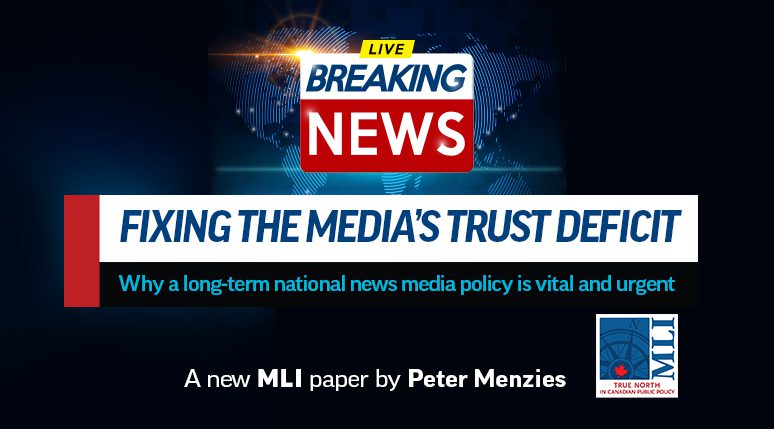By Peter Menzies
November 15, 2022
Executive Summary
Canada is on the cusp of making most of its journalists permanently dependent on the federal government. This is evolving directly through tax relief and subsidy funds and indirectly through offshore tech companies compelled by legislation. While this may permit some of the legacy news organizations to continue to survive financially, this new connection to politicians is eroding public trust in both government and news organizations.
This paper examines major issues that have led to this current state of affairs. In doing so, it illustrates why a long-term national news media policy is now not just necessary, but vital and urgent.
The Internet and the newspaper industry’s inability to adapt to it are almost entirely to blame for the conflagration of what, for more than two centuries, was the core of Canada’s news industry. Having survived the threats posed by the introduction of competition from radio in the 1920s and television in the 1950s, it was broadly assumed that newspapers would survive the threat posed by the Internet as well. But they haven’t.
The Internet has created a world of unlimited choice and been a gift to consumers and innovators. But Canada’s news industry providers have suffered losses of audience engagement and advertising revenue.
The Canadian Radio-television and Telecommunications Commission (CRTC) has ensured that certain levels of Canadian content (which is heavily subsidized due to low domestic market demand) are carried by licensed broadcasters. The CRTC enforces foreign ownership restrictions on currently regulated media – radio and television – through its licensing process. In order to obtain a CRTC licence, a broadcaster must be more than 50 percent owned by Canadians and its board must be made up of a majority of Canadians. This has resulted in the vertical integration of companies.
Canada’s news industry has been unable to adapt to technological change. In the case of print, the collapse of concentrated ownership led to even greater concentration of ownership, which has resulted in more than $200 million in annual public subsidies and tax credits. Some of these were initially intended as temporary measures to assist companies trying to transition into the digital age. But as companies fail to do so, these subsidies and credits are becoming permanent.
What is apparent is that while technology has profoundly disrupted 20th century news delivery systems, all current measures are reactionary or based on assumptions that are no longer valid. Making matters worse, each appears to be oblivious to the impact that it has on the others. The CRTC, for instance, is creating an artificial oversupply of news products by forcing many broadcasters to employ reporters and dedicate airtime to news, as if their local radio station is the sole possible vehicle through which people may obtain the information they seek.
Further complicating the situation is one issue particular to Canada: language. While most of the issues that dominate discussions on news media have been preoccupied with English-language media, French-language media serves a large, important, and influential part of the population; a one-size-fits-all approach is unlikely to succeed. American news channels, for instance, are not accessible to unilingual francophones, who constitute roughly 50 percent of the French-language market.
The public’s trust in its news media, according to the most recent survey by Edelman, is at a record low. Subsidized media continue to insist that independence is not at risk. But conflicts of interest are not matters to be determined by those involved in problematic associations – they are decided by those observing them.
The government should develop and implement a national media strategy – one that focuses on ensuring that citizens have access to accurate information about current events. The strategy should recognize that public trust in both government and news media can only be sustained and flourish if the journalism industry is independent from government funding or approval of legal content. And critically, it should inspire and support the innovation and entrepreneurship required for the industry to move into a new era of digital news delivery.







